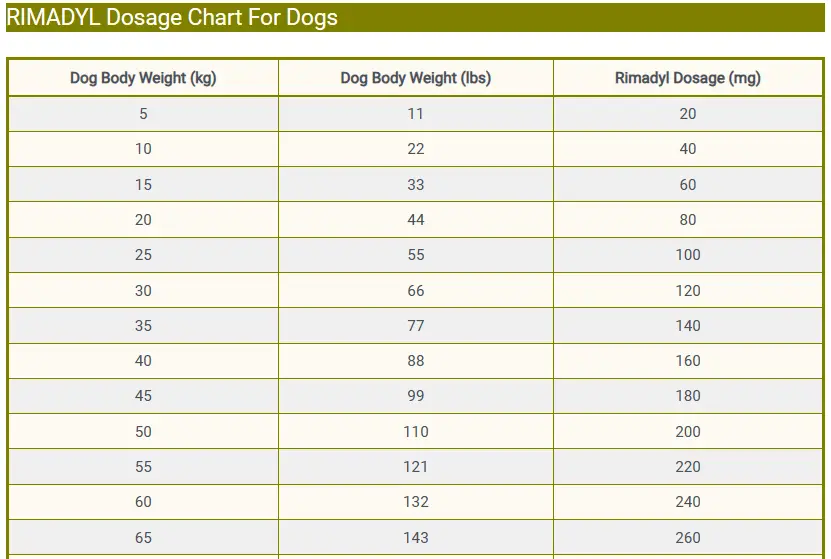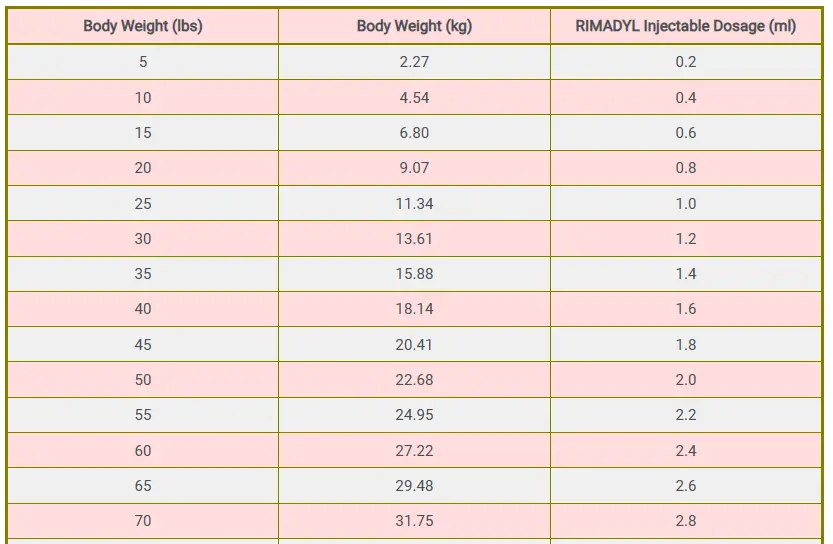The appropriate dosage of Rimadyl (Carprofen) for dogs is 4 mg per kilogram (2 mg per pound) of body weight once daily when treating osteoarthritis or managing postoperative pain related to soft tissue and orthopedic surgeries in canines.
RIMADYL® Dosage For Dogs

-
Ideal Dose: 4 mg/kg (2 mg/lb)
-
Uses: Osteoarthritis or managing postoperative pain related to soft tissue and orthopedic surgeries in canines.
-
FDA Approved: Yes
-
Variants: Chewable & Caplets, Injectable
-
Storage & Handling: Room Temperature
-
Administration: Once Daily
Disclaimer: Self-medication can be hazardous. Please consult your veterinarian for personalized guidance on the appropriate dosage for your furry friend’s specific condition.
When our beloved furry companions are in pain, ensuring they receive the proper treatment is paramount. RIMADYL® (Carprofen) has emerged as a popular choice among veterinarians for managing pain and inflammation in dogs, especially in cases of osteoarthritis and post-surgical discomfort.
However, determining the appropriate dosage is crucial to ensure effectiveness while minimizing the risk of adverse effects. This guide delves into the intricacies of RIMADYL dosage for dogs.
We provide insights and recommendations to help pet owners navigate this aspect of their canine’s healthcare journey with confidence and understanding.
RIMADYL Dosage For Dogs
Rimadyl is a medication commonly prescribed for dogs to alleviate pain and inflammation associated with arthritis or post-surgical pain. It’s crucial to administer Rimadyl with the correct dosage as directed by a veterinarian, as overdosing can be harmful to your dog.
The typical dosage of Rimadyl for dogs is approximately 2 milligrams per pound (4 milligrams per kilogram) of body weight once daily or divided into two doses given every 12 hours. However, Carprofen dosages may vary depending on the specific canine condition being treated, the severity of the pain or inflammation, and the individual dog’s response to the medication.
It’s essential to follow your veterinarian’s instructions precisely regarding the dosage and duration of treatment. Your vet will determine the appropriate Carprofen dosage based on your pup’s weight, overall health, and treatment condition.
Never give your dog Rimadyl or any other medication without consulting a veterinarian first. Your vet will provide accurate dosing instructions tailored to your dog’s needs, ensuring their safety and well-being.
RIMADYL Dosage Chart For Dogs
| Dog Body Weight (kg) | Dog Body Weight (lbs) | Rimadyl Dosage (mg) |
|---|---|---|
| 5 | 11 | 20 |
| 10 | 22 | 40 |
| 15 | 33 | 60 |
| 20 | 44 | 80 |
| 25 | 55 | 100 |
| 30 | 66 | 120 |
| 35 | 77 | 140 |
| 40 | 88 | 160 |
| 45 | 99 | 180 |
| 50 | 110 | 200 |
| 55 | 121 | 220 |
| 60 | 132 | 240 |
| 65 | 143 | 260 |
| 70 | 154 | 280 |
| 75 | 165 | 300 |
| 80 | 176 | 320 |
| 85 | 187 | 340 |
| 90 | 198 | 360 |
| 95 | 209 | 380 |
| 100 | 220 | 400 |
RIMADYL Injectable Dosage Chart For Dogs
The recommended dosage of RIMADYL Injectable for dogs is 0.2 ml per 5 lbs (0.4 per 5 lbs) of body weight.
| Body Weight (lbs) | Body Weight (kg) | RIMADYL Injectable Dosage (ml) |
|---|---|---|
| 5 | 2.27 | 0.2 |
| 10 | 4.54 | 0.4 |
| 15 | 6.80 | 0.6 |
| 20 | 9.07 | 0.8 |
| 25 | 11.34 | 1.0 |
| 30 | 13.61 | 1.2 |
| 35 | 15.88 | 1.4 |
| 40 | 18.14 | 1.6 |
| 45 | 20.41 | 1.8 |
| 50 | 22.68 | 2.0 |
| 55 | 24.95 | 2.2 |
| 60 | 27.22 | 2.4 |
| 65 | 29.48 | 2.6 |
| 70 | 31.75 | 2.8 |
| 75 | 34.02 | 3.0 |
| 80 | 36.29 | 3.2 |
| 85 | 38.56 | 3.4 |
| 90 | 40.82 | 3.6 |
| 95 | 43.09 | 3.8 |
| 100 | 45.36 | 4.0 |
Related Post: Pepto Bismol Dosage For Dogs
RIMADYL 25mg, 75mg, 100mg Dosage Chart For Dogs
| Body Weight (lbs) | Body Weight (kg) | RIMADYL 25 mg | RIMADYL 75 mg | RIMADYL 100 mg |
|---|---|---|---|---|
| 5 | 2.27 | 1/2 Tablet | – | – |
| 10 | 4.54 | 1/2 Tablet | – | – |
| 15 | 6.80 | 1 Tablet | – | – |
| 20 | 9.07 | – | 1/2 Tablet | – |
| 25 | 11.34 | – | – | 1/2 Tablet |
| 30 | 13.61 | – | 1 Tablet | – |
| 35 | 15.88 | – | 1 Tablet | – |
| 40 | 18.14 | – | 1 Tablet | – |
| 45 | 20.41 | – | – | 1 Tablet |
| 50 | 22.68 | – | – | 1 Tablet |
| 55 | 24.95 | – | – | 1 Tablet |
| 60 | 27.22 | – | – | 1 Tablet |
| 65 | 29.48 | – | – | 1, 1/2 Tablet |
| 70 | 31.75 | – | – | 1, 1/2 Tablet |
| 75 | 34.02 | – | – | 1, 1/2 Tablet |
| 80 | 36.29 | – | – | 1, 1/2 Tablet |
| 85 | 38.56 | – | – | 1, 1/2 Tablet |
| 90 | 40.82 | – | – | 1, 1/2 Tablet |
| 95 | 43.09 | – | – | 2 Tablets |
| 100 | 45.36 | – | – | 2 Tablets |
Carprofen Uses in Canines
-
Carprofen is used in dogs for pain relief and inflammation reduction.
-
Common uses include osteoarthritis management, post-surgical pain control, and musculoskeletal pain alleviation.
-
It can also help manage chronic pain from conditions like cancer and aid in dental procedure recovery.
Related Post: Methocarbamol Robaxin Dosage For Dogs
Potential Side Effects
-
Gastrointestinal upset: vomiting, diarrhea, decreased appetite, and potential ulcers or bleeding.
-
Renal effects: changes in urine output, increased thirst, and possible kidney damage.
-
Liver effects: elevated liver enzymes, liver toxicity, jaundice, lethargy, and loss of appetite.
-
Allergic reactions: itching, hives, facial swelling, difficulty breathing, and in severe cases, anaphylaxis.
-
Central nervous system effects: seizures, disorientation, or behavior changes.
-
Bleeding disorders: increased risk of bleeding or bruising, especially in dogs with clotting disorders.
-
Other side effects: increased thirst and urination, weight loss, and changes in behavior.
Which Dogs Should Not Take Carprofen
Canines with the following health issues should not take Carprofen without veterinary recommendations.
-
Dogs with known hypersensitivity or allergy to carprofen or other NSAIDs.
-
Dogs with pre-existing gastrointestinal ulcers, bleeding disorders, or liver or kidney disease.
-
Pregnant or nursing dogs.
-
Dogs receiving concurrent medications that may interact with carprofen.
-
Dogs with a history of gastrointestinal upset or bleeding when previously treated with NSAIDs.
-
Dogs with a history of seizures.











![Can Dogs Eat Blood? 7 Side Effects [Expert Opinion]](https://petskor.com/wp-content/uploads/2022/04/Webp.net-resizeimage-12.jpg)
